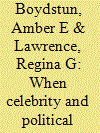|
|
|
Sort Order |
|
|
|
Items / Page
|
|
|
|
|
|
|
| Srl | Item |
| 1 |
ID:
171354


|
|
|
|
|
| Summary/Abstract |
While the rise of celebrities-turned-politicians has been well documented and theorized, how their bids for office are treated by the establishment press has been less closely examined. Research on celebrity politics on the one hand, and on journalism standards on the other, have rarely been brought into conversation with one another. Here, we draw from both literatures to explore how the press covered Donald Trump’s 2016 presidential campaign. Prior research on political journalism would likely have predicted that Trump, with his lack of conventional political experience and a career in reality TV, would have been treated to derisive, dismissive press coverage, which we refer to as “clown” coverage. But Trump’s fame and wealth, and the high entertainment value of his campaign, would also lead the media to cover him heavily. We argue that the collision of entertainment-infused politics with traditional journalism practices created a profound dilemma for the press’s ability to cover the campaign coherently, and that the press responded to this dilemma by giving Trump as much clown-like coverage as serious coverage, throughout not just the primary but also the general election. We support our argument through qualitative evidence from interviews with journalists and other political insiders, and quantitative evidence from a content analysis of New York Times and Washington Post coverage of Trump at key points throughout the campaign.
|
|
|
|
|
|
|
|
|
|
|
|
|
|
|
|
| 2 |
ID:
080273


|
|
|
|
|
| Publication |
Chicago, University of Chicago Press, 2007.
|
| Description |
xiii, 263p.
|
| Standard Number |
9780226042848
|
|
|
|
|
|
|
|
|
|
|
|
Copies: C:1/I:0,R:0,Q:0
Circulation
| Accession# | Call# | Current Location | Status | Policy | Location |
| 053033 | 071.30905/BEN 053033 | Main | On Shelf | General | |
|
|
|
|
|
|
|
|
|